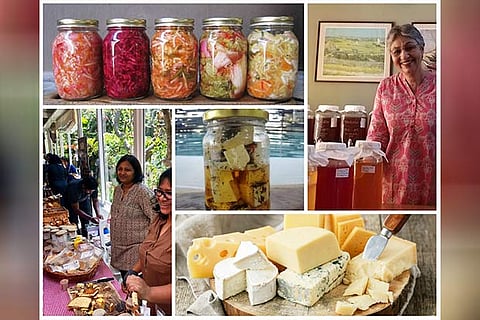

Chennai
Fermented foods are nothing new to the world. They go way back to many centuries, when fermentation was seen with religious significance, and that divine power was responsible for the process. After microbiologist Louis Pasteur demonstrated in early 1800s that souring in milk was caused by bacteria, fermented foods and their benefits to one’s body in promoting good gut health and immunity were understood better. While dishes like kimchi (pickled cabbage dish which is a staple in Korea), sauerkraut (fermented cabbage popular in Europe) and kombucha (fermented tea-based drink) are popular around the world, our city is increasingly embracing fermented foods over the past few years to tap their health benefits. Even though yogurt and butter milk, which also contain good bacteria, have been around, foods and drinks likekombuchas and kefirs are growing popular in Chennai.
City-based entrepreneur Abha Appasamy learned to make probiotics at home as she fought against her personal health issues, including joint pains. Through her brand, Abha’s Probiotics, she is offering drinks, which contain living micro-organisms, such as bacteria, that provide various health benefits. She makes around 10-15 probiotics including, milk kefir (with fermented milk), beet kvass (fermented beet-based drink), pineapple tepache (traditionally made in Mexico out of pineapples), black tea, hibiscus and strawberry kombuchas (black tea-based fermented drinks), and ginger ale (using fermented ginger),among others.
“In probiotic drinks, bacteria that are beneficial to our body multiply. Even though our idli and dosa batter is fermented with the help of bacteria, cooking the batter kills the micro-organisms. On the other hand, probiotic drinks have the good bacteria alive. Our body needs thousands of bacteria for good health, and each kind of probiotic provides a different strain of useful bacteria — which help in creating enzymes and maintain a symbiotic balance in the body. A drink like beet kvass can help with indigestion, constipation and acid reflux issues. Kefir, which is a good source of calcium, has helped me with my joint pains,” 62-year-old Abha tells DT Next.
While all probiotic drinks require bacteria cultures, Abha says one can experiment with fermenting vegetables at home, so as to begin the intake of healthy bacteria. “Veggies like carrots, beans, peels of lime and ginger can all be fermented by keeping them in a brine solution made of rock salt. The vegetables need to be kept under the brine in a glass jar and all air bubbles removed to aid in anaerobic fermentation. After leaving the glass jar for 3-4 days in place, one can transfer it to the refrigerator,” she suggests.
Another fermented food that is being loved increasingly is homemade cheese. Anuradha Krishnamoorthy and Namrata Sundaresan, who founded the cheese shop, Kase, in 2016 noticed that the city’s demand for good cheese grew manifold over three years. “Cheese isbasically fermented milk, wherein microbes play a huge role through lacto fermentation. The microbiomes, when consumed help greatly in maintaining gut health. Culturally, fermented foods have been part of the world for many centuries, we are only getting back to them now,” Namrata says. At their cheese shop, pickled feta is one among the greatest sources of good bacteria. Fermented foods and the bacteria in them are also said to help in treating diarrhoea, improve mental health, reduce allergies and keep your heart happy. Next time you buy vegetables, pickle andferment some.
Visit news.dtnext.in to explore our interactive epaper!
Download the DT Next app for more exciting features!
Click here for iOS
Click here for Android